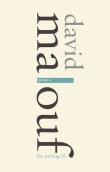AustLit
The material on this page is available to AustLit subscribers. If you are a subscriber or are from a subscribing organisation, please log in to gain full access. To explore options for subscribing to this unique teaching, research, and publishing resource for Australian culture and storytelling, please contact us or find out more.
Latest Issues
AbstractHistoryArchive Description
'Who else, but a writer, is really able to interrogate the work of other writers?
'From Christina Stead, Les Murray and Patrick White to Proust, Shakespeare and Charlotte Bronte, David Malouf reads and examines the work of writers who have challenged, inspired and entertained us for generations. He also explores his own work and the life of the writer, where the ever-present danger is spending too much time talking about writing and not enough doing it.
'These alternative views of some of our best-loved writers and readers will send us scurrying back to read Jane Eyre, Kipling and of course, David Malouf.' (Publication summary)
Publication Details of Only Known VersionEarliest 2 Known Versions of
Works about this Work
-
Provocatively Calm : On David Malouf as Essayist
2017
single work
criticism
— Appears in: TEXT Special Issue Website Series , no. 39 2017; ''This article examines the essays of David Malouf, many of which have been recently collected in three thematic volumes: A First Place (2014a), The Writing Life (2014b) and Being There (2015). My starting point is to argue that Malouf’s most important essays are politically charged. As a writer-activist he posits distinctive, sometimes controversial, positions, arguing strongly and passionately for alternative ways of thinking about Australia and the world, and indeed alternative ways for human beings to move through, and participate in, the world. However, Malouf is no firebrand: the tone of his essays is relentlessly calm; he brings together the emphatic and the empathetic, and he still tries to convince the reader. This article focuses on the political implications of Malouf’s calm but opinionated approach to his essays, as well as on how Malouf sets out to persuade readers. (Introduction) -
Well Read
2015
single work
review
— Appears in: The Advertiser , 10 January 2015; (p. 26)
— Review of Poetry Notebook 2006-2014 2014 selected work essay ; The Writing Life (Book 2) 2014 selected work criticism -
Malouf’s Slow-cooked Recipe for the Literary Life
2014
single work
review
— Appears in: The Weekend Australian , 18-19 October 2014; (p. 16-17)
— Review of The Writing Life (Book 2) 2014 selected work criticism
-
Malouf’s Slow-cooked Recipe for the Literary Life
2014
single work
review
— Appears in: The Weekend Australian , 18-19 October 2014; (p. 16-17)
— Review of The Writing Life (Book 2) 2014 selected work criticism -
Well Read
2015
single work
review
— Appears in: The Advertiser , 10 January 2015; (p. 26)
— Review of Poetry Notebook 2006-2014 2014 selected work essay ; The Writing Life (Book 2) 2014 selected work criticism -
Provocatively Calm : On David Malouf as Essayist
2017
single work
criticism
— Appears in: TEXT Special Issue Website Series , no. 39 2017; ''This article examines the essays of David Malouf, many of which have been recently collected in three thematic volumes: A First Place (2014a), The Writing Life (2014b) and Being There (2015). My starting point is to argue that Malouf’s most important essays are politically charged. As a writer-activist he posits distinctive, sometimes controversial, positions, arguing strongly and passionately for alternative ways of thinking about Australia and the world, and indeed alternative ways for human beings to move through, and participate in, the world. However, Malouf is no firebrand: the tone of his essays is relentlessly calm; he brings together the emphatic and the empathetic, and he still tries to convince the reader. This article focuses on the political implications of Malouf’s calm but opinionated approach to his essays, as well as on how Malouf sets out to persuade readers. (Introduction)
Last amended 20 Oct 2014 09:08:10




